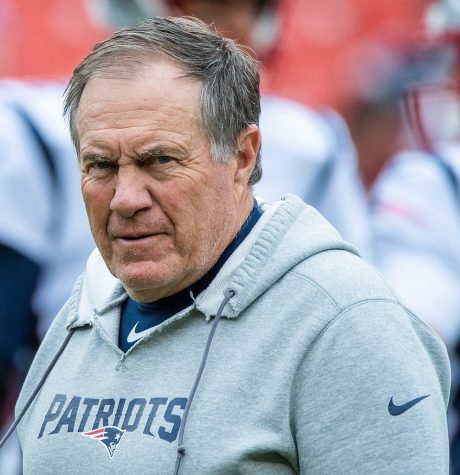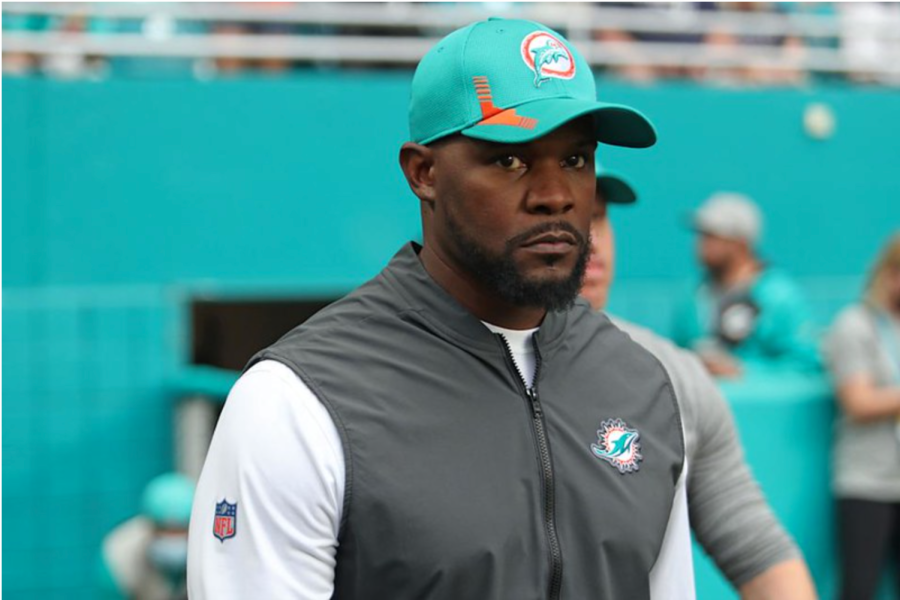The Brian Flores Lawsuit: What Happened and How Will It Impact the NFL?
Former Miami Dolphins Head Coach Brian Flores, pictured here, is currently suing the National Football League.
In the early morning of February First, Tampa Bay Buccaneers quarterback Tom Brady retired. Widely considered the greatest quarterback, and player, to ever play the game, Brady’s retirement was sure to be the biggest news in the NFL until the Super Bowl.
Nope. Around 10 hours later, former Miami Dolphins head coach Brian Flores announced that he was suing the NFL over allegations of racism, in both firing and hiring head coaches. He further alleged that Miami Dolphins owner Stephen Ross offered him $100,000 per loss in Flores’ first season. Ross also allegedly pressured Flores to tamper with an unnamed prominent quarterback in the 2020 offseason.
There are a lot of big questions at play here. Is Flores’ lawsuit going to court, or will the NFL settle? What rules could be put in place to actually prevent systemic racism from invading the managerial offices of the NFL and its 32 teams? And, most importantly, what makes this allegation more dangerous to the NFL than the others that have come before it?
The NFL instituted the Rooney Rule in 2003, which stipulates that teams must interview at least one minority from outside the organization for coaching positions. This was later expanded to the front office and managerial positions as well.
In January 2022, the Miami Dolphins fired Flores after three years. This decision was met with confusion from NFL pundits and fans alike. In his first year, Flores took a team that was predicted to win one or fewer games to a 5-11 record, including a win against the New England Patriots to close out the season. The Dolphins had a winning record in both of Flores’ other seasons, though they missed the playoffs narrowly in both. The team appeared to be on the upswing. Because of the success in Miami, Flores entered the offseason as a top candidate for another team’s head coaching job.
One such team was the New York Giants. According to Flore’s class action complaint filing, on January 26th, Flores had a dinner with Giants general manager Joe Schoen. On January 27th, he had an interview for the head coaching job. If he got it, he would become the first black head coach in the 100-year history of the Giants. On January 25, he got a text from Patriots head coach Bill Belichick.
“Sounds like you have landed – congrats!!” said Belichick, in a text at 2:30 PM. When Flores asked him to elaborate, Belichick responded that he had heard from the Giants and Bills that Flores was “their guy.” Why would Belichick have heard it from the Bills? The answer: Flores wasn’t their guy at all. That title belonged to Buffalo Bills offensive coordinator Brian Daboll. Belichick cleared it up with Flores and that’s where the texts Flores has submitted for the lawsuit come to an end. Flores was never going to be hired, but he still was being interviewed. Why? To fulfill the Rooney Rule.

Does the Flores lawsuit have merit? Possibly. Since his allegations, former Cleveland Browns Head Coach Hue Jackson, who is also black, said he was also paid to lose on purpose. And there’s certainly evidence to back that up, given that Jackson had one win in his 2016 and 2017 seasons combined. But does it even matter? What’s the worst-case scenario for the NFL: They lose a lot of money? In 2020, during the pandemic, the NFL’s teams generated $12.2 billion. Maybe they’ll have to put in a rule to amend the Rooney Rule. Anything the NFL does pertaining to racial equality is exactly like the “end racism” stickers on NFL helmets: It looks good, but it doesn’t do anything meaningful.
What will happen with the Flores lawsuit, then? It’s likely that the NFL settles. The more interesting case is the tanking one. Las Vegas, especially after getting the Raiders, is a cornerstone of the NFL’s money-making process. Gamblers could possibly sue Stephen Ross. So the most likely outcome is the following three things happening: Flores gets a large sum of money but never coaches in the NFL again; Stephen Ross is forced to sell the team; and the NFL amends the Rooney Rule, but it once again is circumvented by the owners and this whole cycle repeats itself down the line. And, like Bountygate, the concussions scandal, and thousands of arrests of NFL players before, the story will fade into the background in a few months. Such is life in the NFL.

Micah Green is a senior at Milken, in his third year as a writer for The Roar. He is excited to be the Co-Editor-in-Chief and the producer for The Milken...



